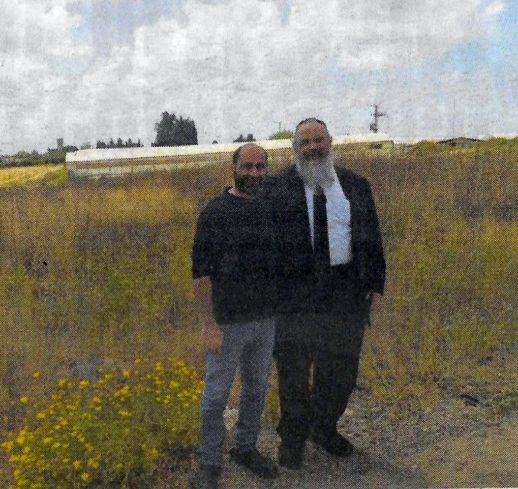This year there are signs like this one all over Israel, Boruch Hashem

Meanwhile in Yesodot, 64 cubic centimeters fell. The very seeds which had been planted before Rosh Hashana, months earlier, received the amount of rainfall they needed and germinated. "The rain which fell at precisely the right time produced a blessed harvest, filling the fields," he relates excitedly.
And that's not all. When the winter progressed, the farmers received orders from the rabbonim of the Shmittah organization, to quickly harvest the crop, before the wheat grains formed.
"We must keep in mind that this crop is intended for fodder alone, so that it must be harvested before the wheat grains ripen since the animals only need the stalks and not the grain."
This was a very unusual and decisive time for a farmers.
"A severe shortage of wheat developed on the world market because of the war between Ukraine and Russia. The price of wheat shot up thousands of shekalim per ton so that a wheat field of 2,000 dunam would be worth millions of shekalim. And now the rabbonim, governed by the rulings of the Chazon Ish, directed to harvest the fields before the wheat began to ripen! We cannot begin to imagine what a test this is for the farmers!"
But these farmers are mighty ones and stood up to the test.
"One farmer called me up and said, 'I find it hard to believe, but the harvest of the stalks was double than every year."
Notwithstanding, they couldn't help feeling that they had lost out because of Shmittah.
"But Hashem has His inscrutable ways," Rabbi Cohen continues movingly. "They harvested before Purim. Another 100 cubic meters of rain fell afterwards and they were able to make a second harvest this week. Imagine a farmer who has a hen which lays an egg a day and suddenly begins laying two a day! Thanks to the seeds which were sown before Rosh Hashonoh! The second crop of dozens of dunam is truly a miracle!"
Rabbi Cohen standing with one of the farmers in front of his fallow field

The Rosh Yeshiva's Tears
We cannot help but end up with the story of Bar Zakai, a farmer from Kidron, who caused the Rosh Yeshiva, HaRav Aharon Leib Shteinman zt"l, to shed tears and ask him for a blessing.
"His olive grove burned down totally on Yom Kippur of the previous Shmittah year," Rabbi Cohen tells. "It was caused by terrorists from a nearby Arab village who took advantage of the fact that there was no one around that day. 300 dunam of trees were destroyed."
On the day after Yom Kippur Bar Zakai invited the people from Property Tax to survey the damage. An olive tree is the prime of all trees. Its wood is used for furnace fuel since it burns better than other wood, proven by the fact that the trees in the grove burned continually for twenty-four hours. The ground was covered with ash and coals which filtered down into artesian water supplies.
"The office of Property [mas rechush] and the Ministry of Agriculture recognized this fire as a terrorist act of arson, and agreed to pay damages on condition that the ground undergo the overhaul process of uprooting all the trees."
Bar Zakai, a Shmittah-observant farmer, was in a dilemma. He was told that without that work, he would not receive indemnities amounting to millions of shekalim.
The rabbonim of Keren Hashevi'is went with Bar Zakai to speak with HaRav Shteinman zt"l. The rabbonim still recall how moved HaRav Shteinman was by the dilemma of the farmer which was a matter of hundreds of thousands of shekalim.
There was no direct hetter. They started to discuss if because of the big loss perhaps it could be done by a goy or some other indirect way,
However Bar Zakai asked, "If the Beis Hamikdash is built, would the olives in my orchard then be worthy of producing oil for the Menorah?"
HaRav Shteinman said that since the approaches were all bedi'eved they would probably not be worthy of use in the Beis Hamikdash.
"If so what do I need olives for?" asked Bar Zakai.
Maran HaRav Shteinman was very moved. Tears were evident in his eyes. He reached out to the farmer and said, "Give me a blessing."
The farmer was beside himself. "I came so that the Rav will bless me," he said.
HaRav Shteinman replied, "You should know that someone who does something that is beyond normal nature, HaKodosh Boruch Hu repays him in the same way. Mei'al derech hateva."
Several months passed. One day, he calls Rabbi Cohen, choked with tears. "You won't believe what happened here," he said. Rabbi Cohen was certain that something terrible had taken place.
"On the contrary," Bar Zakai insisted. "Rain fell here for five days nonstop. When the skies cleared, I went to the grove to check up, and couldn't believe my eyes! The rain did a cleanup on the ground. No ashes, nothing. The trees looked as if they had been born-again.
"A few weeks passed and buds of new leaves appeared on the trees. Do you remember what HaRav Shteinman said? That whoever does an act above and beyond the way of nature, will be repaid by Hashem in a similar supernatural way."
The olive grove sprang back to life. If he had obeyed what the Ministry of Agriculture had directed, he would have had to start from scratch, wait three years of orla and another year of neta revai before he could enjoy the crop, while a mere few days of rainfall, the blessing from Heaven, resuscitated the grove.
"I will command My blessing." Literally.




